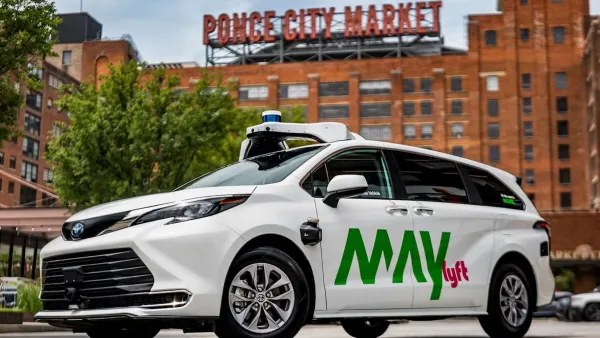Cities like Atlanta, that have grown up in the age of the automobile and air conditioning, are making efforts to green their environmentally unfriendly buildings and spaces, explains Emily Badger.
Badger points to the dual curses of the car and the air conditioner, as causing Southern cities to evolve into places with congested and sprawling interstates and centralized air enclosed buildings with small windows and no natural air flow.
"It's the difference between a city that has grown up in the automobile age and a city that has grown up before the automobile age," says Paula Vaughan, the co-director in Atlanta of the Sustainable Design Initiative at the architecture firm Perkins+Will. Older cities are inherently compact and walkable (and further on their way to sustainability) because no one was driving anywhere when they were built.
Atlanta and its younger Southern counterparts are looking to change their unsustainable ways, however. "The downtown business district has launched a Better Buildings Challenge in which property owners are pledging to reduce their energy and water consumption by 20 percent by 2020." And as of this spring, "Midtown now has a 'greenprint' – a kind of sustainability blueprint that civic leaders hope will lead the neighborhood to become the 'South's first eco-district' (following a model of existing neighborhood-scale plans in Portland and Seattle)." The proposal lays out inclusion of higher-performance buildings, more green spaces and better-connected streets with Zipcar stations and walkable sidewalks.
According to Badger, the city has already made steps to rebuild their urban form and have retrofitted numerous buildings for energy efficiency, but the Big Peach still a ways to go. "People still have that notion of sitting in the highway in your car in the 90-degree heat to get to work," Vaughan says. "We're really changing that. I think it's going to take a while before people in other cities start recognizing that. But yeah, word is getting out."
FULL STORY: How to Green Southern Cities Built in the Age of Cars and Air Conditioning

Planetizen Federal Action Tracker
A weekly monitor of how Trump’s orders and actions are impacting planners and planning in America.

Chicago’s Ghost Rails
Just beneath the surface of the modern city lie the remnants of its expansive early 20th-century streetcar system.

Amtrak Cutting Jobs, Funding to High-Speed Rail
The agency plans to cut 10 percent of its workforce and has confirmed it will not fund new high-speed rail projects.

Ohio Forces Data Centers to Prepay for Power
Utilities are calling on states to hold data center operators responsible for new energy demands to prevent leaving consumers on the hook for their bills.

MARTA CEO Steps Down Amid Citizenship Concerns
MARTA’s board announced Thursday that its chief, who is from Canada, is resigning due to questions about his immigration status.

Silicon Valley ‘Bike Superhighway’ Awarded $14M State Grant
A Caltrans grant brings the 10-mile Central Bikeway project connecting Santa Clara and East San Jose closer to fruition.
Urban Design for Planners 1: Software Tools
This six-course series explores essential urban design concepts using open source software and equips planners with the tools they need to participate fully in the urban design process.
Planning for Universal Design
Learn the tools for implementing Universal Design in planning regulations.
Caltrans
City of Fort Worth
Mpact (founded as Rail~Volution)
City of Camden Redevelopment Agency
City of Astoria
City of Portland
City of Laramie





























